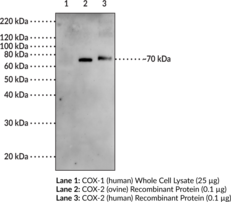Description
Adenylate cyclase type 3 (AC3) is a membrane-bound protein that catalyzes the formation of the second messenger cAMP from ATP (Item No. 14498) in response to G protein-coupled receptor (GPCR) signaling.{55136,55137} It consists of 1,144 amino acids and is comprised of a cytoplasmic N-terminus followed by two repeating modules, each consisting of a transmembrane domain and a cytoplasmic domain, with the transmembrane domains composed of six membrane-spanning helices apiece.{55135,55136} ADCY3, the gene encoding AC3, is expressed in a variety of tissues, with high levels in the placenta, testes, ovaries, and colon in humans.{55136,55135} AC3 also localizes to primary cilia in the brain and has been used as a marker of primary cilia in mouse brain.{55138,55139} Mutations in ADCY3 are associated with an increased risk of obesity and type 2 diabetes.{55137,55135,55138} Cayman’s Adenylate Cyclase Type 3 Polyclonal Antibody can be used for immunocytochemistry (ICC), immunohistochemistry (IHC), and Western blot (WB) applications. The antibody recognizes AC3 at approximately 160 kDa from human, mouse, and rat samples.
Synonyms: ACIII|Adenylate Cyclase III|Adenylyl Cyclase 3|Adenylyl Cyclase Type III
Immunogen: Synthetic peptide corresponding to the C-terminal region of rat adenylate cyclase type 3 conjugated to KLH
Formulation: 100 µl of affinity-purified polyclonal antibody
Isotype:
Applications: WB, IHC, ICC
Origin:
Stability: 365 days
Application|Immunocytochemistry||Application|Immunohistochemistry||Application|Western Blot||Product Type|Antibodies|Polyclonal Antibodies||Research Area|Cell Biology|Cell Signaling|cAMP Signaling||Research Area|Endocrinology & Metabolism|Metabolic Diseases|Diabetes||Research Area|Endocrinology & Metabolism|Metabolic Diseases|Obesity||Research Area|Neuroscience



